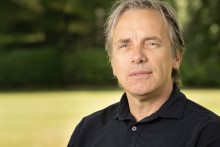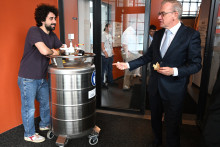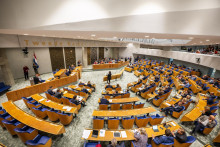 |
| Ibsen Chivata Cardenas is from the Republic of Colombia and a PhD student in the Faculty of Engineering and Technology. Photo: Gijs van Ouwerkerk |
For the past year, Cardenas has been working towards his PhD in the Department of Construction Management and Engineering. His goal is to create a framework that will improve geotechnical decision-making during the construction of major projects. Focusing on tunnel works, Cardenas recognizes that incomplete information and lack of knowledge about ground conditions can create a number of uncertainties in geotechnical engineering.
`Most problems during construction of tunnels are caused by the mechanical properties of the soil, the hydrological regime, and human beings not taking all viable information and risks into account. Managers and engineers can become overconfident in their data and underestimate the uncertainties,' explains Cardenas.
Dominated by the Andes mountains, the Republic of Colombia actually has some of the longest tunnels in South America, but Cardenas insists that his focus is only coincidental. He hopes to elicit expert knowledge from construction teams who are involved in building tunnels in Amsterdam, London, Madrid, and Rome.
`Once I have collected this expert knowledge, including historic cases of failure and uncertainty treatment in the current literature, then I will research how actual decisions are made in the field,' continues Cardenas. `Ultimately, I hope to identify the interaction between risks and possible failures, and design a model that provides a structured portfolio of criteria to analyze and provide information on how to cope with uncertainties.'
`Every decision you make, you have to face and deal with uncertainties,' Cardenas says with certainty. `You never have perfect information to make your decision. Realizing these possible unknown factors becomes vital to those decisions in geotechnical engineering. In fact, most failures associated with unforeseen risks are strongly related to not using or misusing available information.'
Cardenas was born in Bogata and received his degree in civil engineering and a Masters in Environment and Development from the National University of Colombia in his capital city. But his heart remains in Manizales, where his wife Victoria and 4-year-old son Jeronimo live. Built in a mountain region with a number of ridgelines and steep slopes, Manizales is the main center for the production of Colombian coffee. It also is one of the country's intellectual centers with six colleges and universities. `Manizales is the most beautiful place in Colombia,' Cardenas says as his eyes seem to wander there. `It's a place that can intellectually stimulate you with its landscape, sunsets, lovely people, and, of course, my son!'
`I am starting to feel the same way here in the Netherlands,' Cardenas quickly returns to the Drienerburght Hotel lobby. `The Dutch are tolerate, friendly and kind. I appreciate how well economic resources are distributed here. In my country, there is less equality with a greater difference between the rich and poor.'
And what about the weather? Colombia is near the equator and except in the higher altitudes temperatures average around 20C (59F). `I'd rather not talk about the weather,' Cardenas smiles sheepishly. `But I do notice that Dutch people complain about it.'
Cardenas hopes to finish his research in October 2012 and to have his family join him in Enschede next year. `I am very happy for this chance to study in the Netherlands. During my masters program, I realized how much I love to do research. I am grateful for the financial support that I have received from the University of Twente and the Dutch research institute Deltares to do what I enjoy most.'
In his little spare time, Cardenas enjoys reading. `Kafka's writing is strange, but I like the fantastical, mysterious, ambiguous worlds he creates. He is able to communicate a unique perspective on life.'







